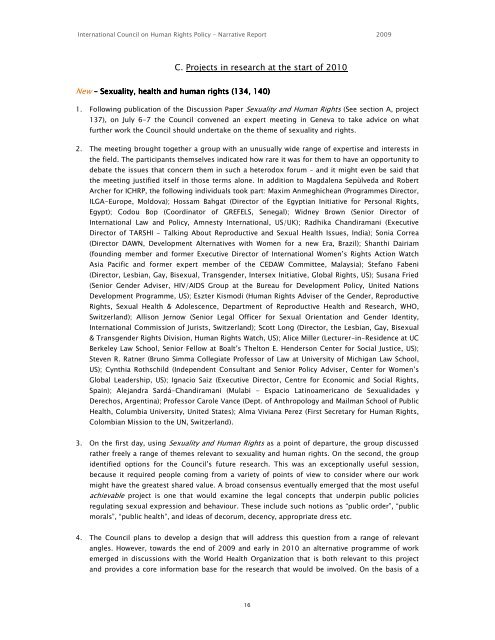NARRATIVE REPORT 2009 - The ICHRP
NARRATIVE REPORT 2009 - The ICHRP
NARRATIVE REPORT 2009 - The ICHRP
Create successful ePaper yourself
Turn your PDF publications into a flip-book with our unique Google optimized e-Paper software.
International Council on Human Rights Policy - Narrative Report <strong>2009</strong><br />
C. Projects in research at the start of 2010<br />
New – Sexuality, health and human rights (134,<br />
(<br />
140)<br />
1. Following publication of the Discussion Paper Sexuality and Human Rights (See section A, project<br />
137), on July 6-7 the Council convened an expert meeting in Geneva to take advice on what<br />
further work the Council should undertake on the theme of sexuality and rights.<br />
2. <strong>The</strong> meeting brought together a group with an unusually wide range of expertise and interests in<br />
the field. <strong>The</strong> participants themselves indicated how rare it was for them to have an opportunity to<br />
debate the issues that concern them in such a heterodox forum – and it might even be said that<br />
the meeting justified itself in those terms alone. In addition to Magdalena Sepùlveda and Robert<br />
Archer for <strong>ICHRP</strong>, the following individuals took part: Maxim Anmeghichean (Programmes Director,<br />
ILGA-Europe, Moldova); Hossam Bahgat (Director of the Egyptian Initiative for Personal Rights,<br />
Egypt); Codou Bop (Coordinator of GREFELS, Senegal); Widney Brown (Senior Director of<br />
International Law and Policy, Amnesty International, US/UK); Radhika Chandiramani (Executive<br />
Director of TARSHI - Talking About Reproductive and Sexual Health Issues, India); Sonia Correa<br />
(Director DAWN, Development Alternatives with Women for a new Era, Brazil); Shanthi Dairiam<br />
(founding member and former Executive Director of International Women’s Rights Action Watch<br />
Asia Pacific and former expert member of the CEDAW Committee, Malaysia); Stefano Fabeni<br />
(Director, Lesbian, Gay, Bisexual, Transgender, Intersex Initiative, Global Rights, US); Susana Fried<br />
(Senior Gender Adviser, HIV/AIDS Group at the Bureau for Development Policy, United Nations<br />
Development Programme, US); Eszter Kismodi (Human Rights Adviser of the Gender, Reproductive<br />
Rights, Sexual Health & Adolescence, Department of Reproductive Health and Research, WHO,<br />
Switzerland); Allison Jernow (Senior Legal Officer for Sexual Orientation and Gender Identity,<br />
International Commission of Jurists, Switzerland); Scott Long (Director, the Lesbian, Gay, Bisexual<br />
& Transgender Rights Division, Human Rights Watch, US); Alice Miller (Lecturer-in-Residence at UC<br />
Berkeley Law School, Senior Fellow at Boalt’s <strong>The</strong>lton E. Henderson Center for Social Justice, US);<br />
Steven R. Ratner (Bruno Simma Collegiate Professor of Law at University of Michigan Law School,<br />
US); Cynthia Rothschild (Independent Consultant and Senior Policy Adviser, Center for Women’s<br />
Global Leadership, US); Ignacio Saiz (Executive Director, Centre for Economic and Social Rights,<br />
Spain); Alejandra Sardá-Chandiramani (Mulabi - Espacio Latinoamericano de Sexualidades y<br />
Derechos, Argentina); Professor Carole Vance (Dept. of Anthropology and Mailman School of Public<br />
Health, Columbia University, United States); Alma Viviana Perez (First Secretary for Human Rights,<br />
Colombian Mission to the UN, Switzerland).<br />
3. On the first day, using Sexuality and Human Rights as a point of departure, the group discussed<br />
rather freely a range of themes relevant to sexuality and human rights. On the second, the group<br />
identified options for the Council’s future research. This was an exceptionally useful session,<br />
because it required people coming from a variety of points of view to consider where our work<br />
might have the greatest shared value. A broad consensus eventually emerged that the most useful<br />
achievable project is one that would examine the legal concepts that underpin public policies<br />
regulating sexual expression and behaviour. <strong>The</strong>se include such notions as “public order”, “public<br />
morals”, “public health”, and ideas of decorum, decency, appropriate dress etc.<br />
4. <strong>The</strong> Council plans to develop a design that will address this question from a range of relevant<br />
angles. However, towards the end of <strong>2009</strong> and early in 2010 an alternative programme of work<br />
emerged in discussions with the World Health Organization that is both relevant to this project<br />
and provides a core information base for the research that would be involved. On the basis of a<br />
16
















